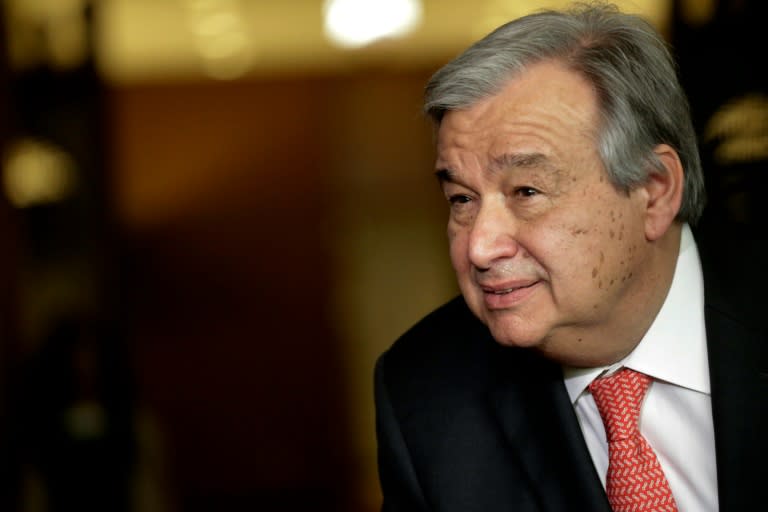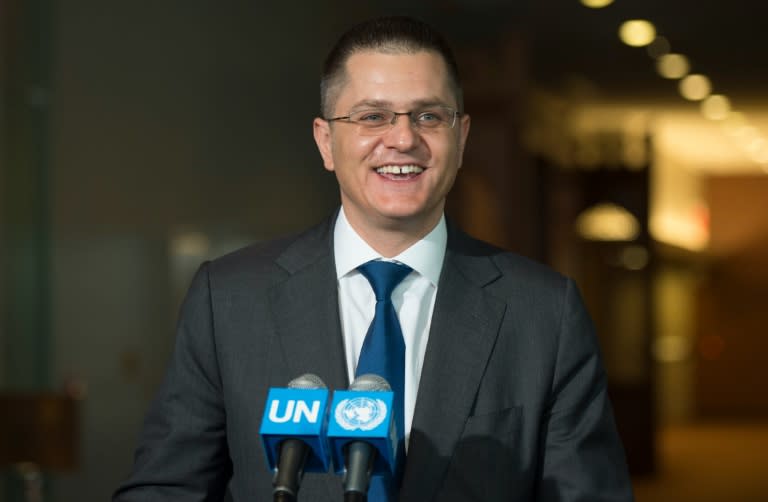Portugal's Guterres holds lead in UN chief race
Portugal's former prime minister Antonio Guterres maintained his lead in the race to become the next UN secretary-general following a fifth straw poll by the Security Council on Monday, diplomats said. Bulgaria's Irina Bokova failed to make a strong showing in the informal vote by the 15-member council, paving the way for European Union vice president Kristalina Georgieva to possibly replace her as Sofia's candidate. Guterres, who served as UN refugee chief for 10 years and was prime minister from 1995 to 2002, picked up 12 votes of encouragement, two "discourage" votes and one "no opinion", the same result as the previous informal vote. It was the fifth time that the 67-year-old has taken the number-one spot in the contest to succeed Ban Ki-moon, the former South Korean foreign minister who steps down on December 31 after 10 years as the world's top diplomat. None of the other eight candidates picked up the minimum nine votes required to become the Security Council's nominee for the top post. "There is really only one person with nine positive votes," said a Security Council diplomat, who spoke on condition of anonymity. "Guterres remains well ahead." The next straw poll is scheduled for October 5 but the five veto-wielding powers will be using colored ballots in that round to indicate whether they would block a candidacy. "If there is a veto (against Guterres), the whole thing opens up," said a council diplomat. Russia has said it would prefer a candidate from Eastern Europe to become the next UN chief, but it remains unclear if it will use its veto to block a contender from another region. French Ambassador Francois Delattre said the outcome of the straw poll "was very useful in clarifying the situation for all of the candidates". Monday's ballot followed a week of behind-the-scenes lobbying for candidates while world leaders were in New York to attend the General Assembly meeting. Council members are hoping to agree on a nominee in the coming weeks and present that candidate to the General Assembly for approval. - Last chance for Bokova ? - The 15 ambassadors, including those from the powerful five permanent members -- Britain, China, France, Russia and the United States -- met behind closed doors to rate the candidates. Serbia's ex-foreign minister Vuk Jeremic came in second with eight positive votes, six negative and one "no opinion", followed by Slovakia's Foreign Minister Miroslav Lajcak, who took the second place in the last round. Lajcak picked up eight positive votes and seven "discourage" votes. Diplomats were watching Bokova's showing after the government in Sofia said it may consider switching candidates if she failed to get a top spot. Bokova, who heads the UN's culture and education agency UNESCO, picked up six votes of encouragement, seven "discourage" votes and two "no opinion". That put her behind Slovenia's ex-president Danilo Turk and Argentina's Foreign Minister Susana Malcorra, who each got seven positive votes, seven negative votes and one "no opinion." New Zealand's former prime minister and head of the UN Development Program Helen Clark tied with Macedonia's ex-foreign minister Srgjan Kerim with six encouragements and nine "discourage" votes. The former foreign minister of Moldova, Natalia Gherman, took the last spot. The latest in the string of straw polls came amid growing frustration on the council over the failure of diplomatic efforts to end the war in Syria, with the United States, Britain and France at odds with Russia. British Ambassador Matthew Rycroft said it was "important to treat the issues on their merits", when asked whether the tensions could complicate the selection process of the next UN chief.




